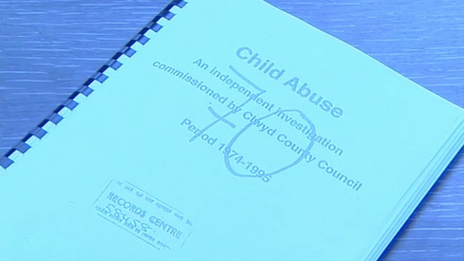Jillings report: The main points
- Published

The Jillings report remained unpublished for 17 years
A report into allegations of historic sex abuse in north Wales children's homes has finally been published 17 years after it was written.
The Jillings report had remained unpublished after fears compensation claims and litigation could follow by those named in the report.
However following criticism last year that the subsequent Waterhouse inquiry into the issue had not uncovered the full-scale of the abuse, the BBC submitted a Freedom of Information request to get the Jillings report made public.
ABUSE
The report examined claims of abuse in nearly 40 care homes in the former Clwyd County Council area from the 1970s to the 1990s. The authors found evidence of "extensive abuse" over a "substantial" number of years and said children were severely disturbed by it. The report said at least 12 young people died. The claims centred on allegations of historic abuse made in the early 1990s relating to the Bryn Estyn home in Wrexham, which closed in 1984, involving "at least" 24 young people. A police investigation and subsequent trial saw seven former staff convicted of abusing children.
INVESTIGATION DIFFICULTIES
The panel of three felt hampered by a number of constraints "some of them to a serious extent". Some information was retained by the police for legal reasons (see below). Much of the the council material was incomplete, in the wrong order, and some was undated and unsigned. There were delays receiving responses from the council and some staff refused to be interviewed. The panel felt it had "major gaps" in its knowledge for these reasons and also stressed it could not successfully address "wider areas of concern including that public figures had been involved in the abuse".
POLICE
Concerns were raised with the chief constable of North Wales Police about the independence of the investigation into the abuse allegations. The report said the chair of social services and the county secretary and solicitor told North Wales Police and the Home Office that profoundly serious allegations against members of the police should not be investigated. The police also declared 130 boxes of files to be sub judice and did not hand them over to the panel. The report found there was no mechanism to ensure independent investigations of allegations against officers were carried out.
IMPACT ON CHILDREN
The report found "time and time again" the response to indications children may have been abused were "too little and too late". The needs of young people were "incidental rather than a primary concern". It said there had been "a conflict of interest between safeguarding professional position versus the safety of children and young people. The interests of children have almost invariably been sacrificed".
The panel's investigation gave residents the chance to "bear witness to what they had experienced and to share the anguish that they felt over lives distorted by abuse." Many said: "This is the first time I have felt heard." The Jillings authors said that without exception former residents "did not appear to be motivated out of a desire for financial recompense (as had been feared and alleged) or out of malice". They added: "The motivation appeared to be a genuine desire to see the situation improved for children in care - to safeguard the protection of future children."
FINDINGS AND FATE OF REPORT
The panel referred to the fact there were at least 10 previous internal inquiries at Clwyd council, and questioned their outcomes. An earlier report on the Cartrefle children's home, Broughton, in 1992, was not published because of concerns it may prejudice a trial and also because of concerns it may invalidate the council's insurance. The panel made reference specifically to this buried report "in the hope that by doing so such a fate will not overtake our report". They called for a judicial inquiry in "full public scrutiny." Their hopes for their report were dashed: the council shelved the report. Mr Jillings claimed it was because of council fears over insurance claims.
A tribunal of inquiry was later held by retired High Court judge Sir Ronald Waterhouse which gathered evidence from 650 people over four years, reporting in 2000 which mostly focused on seven homes. However that inquiry did not submit the Jillings report in evidence, saying its contents were "largely hearsay in relation to the issues that we had to decide on, on which we were to receive direct evidence". The successor authorities to Clwyd eventually published the document after a Freedom of Information request from the BBC. A new police investigation into abuse claims, Operation Pallial, and a review of the Waterhouse inquiry led by Mrs Justice Macur are ongoing.
- Published8 July 2013
- Published8 July 2013
- Published8 July 2013
- Published10 November 2012